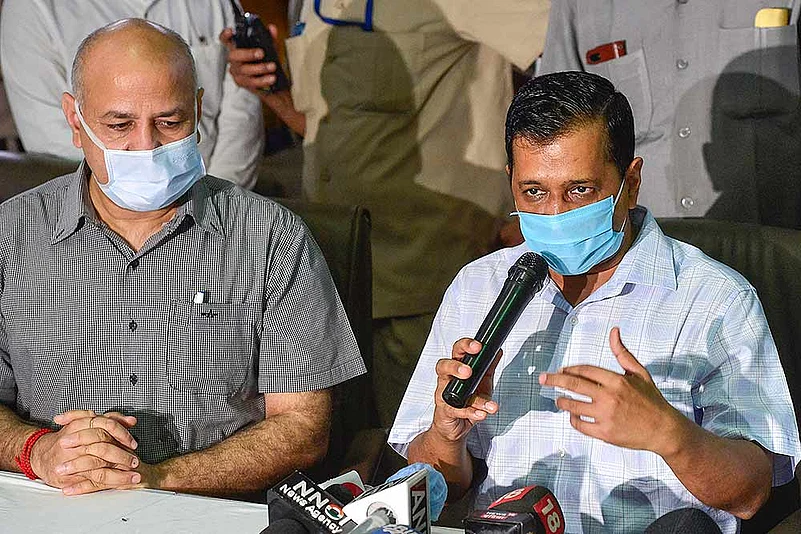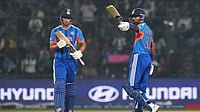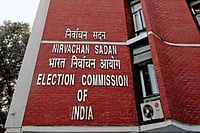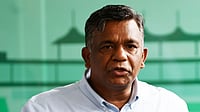Lt Governor Anil Baijal and the AAP government are locked in another round of confrontation over the appointment of public prosecutors in cases related to Delhi riots and anti-CAA protests, with the LG asking Chief Minister Arvind Kejriwal to decide within a week on the Delhi Police's proposal recommending the names of six senior advocates.
Baijal, in a letter to Kejriwal, said that acting Home Minister Manish Sisodia did not agree to the Delhi Police proposal despite the force providing detailed justification for it.
The Delhi Police has proposed to appoint the six senior advocates to argue on its behalf in 85 cases of riots in Northeast Delhi, sources said.
It has also proposed that 24 cases of protests against the Citizenship Amendment Act (CAA) be assigned to special public prosecutors, appointed in June when the LG invoked his special powers after the Delhi government rejected the names recommended by the Delhi Police.
The AAP said it has a "strong objection to the constant intervention" of the LG in the appointment of Special Public Prosecutors for cases pertaining to Delhi riots and anti-CAA protests, insisting that the prosecutors have to be "independent" to ensure a free and fair trial.
Calling Delhi riots a "blot" on Delhi and the entire country, senior AAP leader and Rajya Sabha MP Sanjay Singh said the AAP government is committed to ensure the strictest possible punishment to all those involved in the violence.
"But for that to happen, independent investigation by the police and a free and fair trial are a must. The LG and the central government are insisting on the appointment of a panel of Special Public Prosecutors chosen by the central government. This is happening at a time when there are very serious allegations on the response of Delhi Police to these riots as well as how the investigation process is going on," he said.
In his letter, the lieutenant governor said that he had called the file pertaining to the matter for perusal on July 14 under Rule of 19 (5) of the Transaction of Business Rules (TBR), the sources said.
Baijal said that he had requested the home minister to reconsider his decision and agree to the proposal of the Delhi Police.
Sources said that there was a meeting between Baijal and Sisodia through video conference on Friday to settle the difference of opinion, but the matter could not be resolved.
"Since the difference of opinion still persists, I would request the chief minister to expeditiously refer the matter to the Council of Ministers under Rule 49 of TBR of GNCTD, 1992 with Section 45 (c) of the Government of NCT Act, 1991.
"In view of urgency and sensitivity of the matter, it is requested that the decision of Cabinet be communicated expeditiously, preferably within a week," a source quoted Baijal as having said in the letter.
Sources also said that if the Delhi Cabinet doesn't agree with the Delhi Police's request, the L-G will have an option to invoke his special powers under the provisions of Article 239AA(4) of the Constitution.
The first round of confrontation between the AAP dispensation and the L-G's office had emerged in June over the appointment of 11 special public prosecutors to argue cases pertaining to the communal riots in northeast Delhi in February.
When the Delhi government had rejected the police's request on the issue, the L-G had invoked the power under Article 239AA(4).
AAP leader and MLA Raghav Chadha said that under the Constitution, the lieutenant governor of Delhi has special powers to overturn any decision of the elected government. The Supreme Court has, however, made it clear that this power has to be used in the rarest of rare cases.
Last month, the LG used these extraordinary powers to appoint 11 central government lawyers to represent cases pertaining to Delhi riots in the lower courts, he said.
"Now, the LG wants to appoint central government lawyers to represent these cases in the High Court and Supreme Court too," he said, stressing that Delhi Police being the investigating agency should have no role in deciding the lawyers.
Responding to AAP's allegations, the LG office said that effective prosecution in cases relating to riots and anti-CAA protests is the need of the hour.
In a statement issued late evening, Baijal said that these cases involved large scale communal violence and require careful handling in view of the gravity and deep impact on the society.
"We are committed to ensure that the guilty in the Riot cases are awarded the strictest punishment as per law," the LG said in statement.
Since the cases are of highly sensitive nature, very large in numbers and there are several petitions including bail matters, applications and writ petitions which have been filed in various courts, these require constant monitoring and coordination across different courts.
"It was therefore felt that a dedicated team of prosecutors is needed and senior law officers/senior advocates/advocates may also be appointed as special public prosecutors to ensure that the cases are handled properly and in a focussed manner," the statement stated.
It is beyond doubt that the public prosecutor represents the state by virtue of his office. At the same time, he is also an officer of the court and is required to render assistance to the court to arrive at a just and equitable decision, it said.
"Therefore, there is no reason to imagine that the public prosecutors appointed would not perform their duty fearlessly and impartially as the officers of the court.
"We have full faith in the judicial process and we are committed to ensuring that the guilty in the riot cases are awarded the strictest punishment as per law," it said.


























